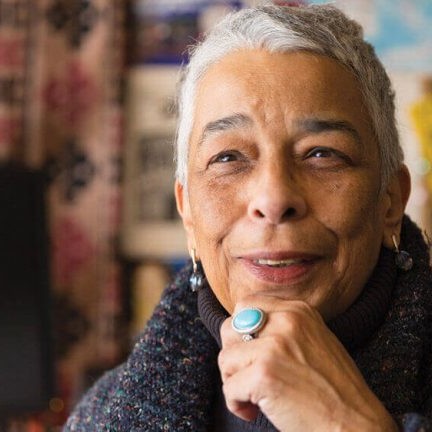Thulani Davis. Photo: University of Wisconsin-Madison Authors and critics, including Nadia Owusu, Sabrina Orah Mark, and Ayad Akhtar, share their year in reading at The Millions. Takashi Oka, former Tokyo bureau chief of the New York Times and representative in Washington of Japan’s Liberal Party, has died at the age of ninety-six. At the New York Review of Books, Batya Ungar-Sargon looks back at Benjamin Day’s New York Sun, the country’s first penny press, and popular journalism’s blue-collar origins: “More than promoting any particular ideology, the penny press made visible New Yorkers who weren’t people of means. Rather than
Nikki Giovanni At the New York Times, a profile of Nikki Giovanni, the poet, children’s book author, and nonfiction writer with over thirty books to her credit. Looking back at her career, Giovanni says, “I thought 50 years ago that I could make a big difference in the world. What I know now is that I will not allow the world to make a big difference in me. That’s what’s incredibly important. I’m not going to let the fact that I live in a nation with a bunch of fools make a fool out of me.” At the New
Maria Tumarkin. Photo: Transit Books In a raft of high-level promotions and restructuring at Condé Nast, Anna Wintour has been given two new titles: global editorial director of Vogue and worldwide chief content officer. As New York Times media reporter Edmund Lee notes, Wintour will now have “final say over publications in more than 30 markets around the world.” The University of Mississippi has fired Garrett Felber, a tenure-track assistant professor and vocal scholar of Malcolm X, the American carceral state, and anti-racism, citing poor communication. In October, Felber took to Twitter to describe how the university rejected a
Elizabeth Hinton Editor Gerald Howard looks back on the glory days of the American trade paperback. Howard worked at Penguin Books in the 1980s, when a productive rivalry with Vintage spurred a contemporary fiction boom: “There was a lot of fun to be had in publishing in those years by being ‘Contemporary.’ It was definitely a moment and people who worked in trade paperback in those years remember it fondly.” At the Associated Press, Hillel Italie recaps a tumultuous year in publishing. As Simon Schuster CEO Jonathan Karp puts it: “A lot of what has happened this year—if it
Pamela Sneed. Photo: Patricia Silva John le Carré—author of Cold War novels such The Spy Who Came in from the Cold and Tinker, Tailor, Soldier, Spy—has died. Le Carré, whose real name was David John Moore Cornwell, studied at Oxford, worked undercover for British intelligence, and created one of the best-known fictional spies of all time, George Smiley. Ruth Bader Ginsburg’s final book, Justice, Justice Thou Shalt Pursue: A Life’s Work Fighting for a More Perfect Union, cowritten with Amanda L. Tyler, will be published by University of California Press in March. The New York Times culture desk has
Anthony Veasna So. Photo: Chris Sackes Friends, editors, and readers mourn the unexpected loss of fiction writer Anthony Veasna So, who died this week at age twenty-eight. So had published stories in n+1, the New Yorker, and Granta, and his debut collection, Afterparties, is forthcoming this summer. At The Nation, Billie Allen writes about his friend Brandon Bernard, the ninth inmate to be executed since the Justice Department ended a seventeen-year moratorium on capital punishments in July. There are at least four more executions scheduled before Inauguration day. For more on Bernard’s case, see E. Tammy Kim’s New Yorker
Zahia Rahmani. Photo: Deep Vellum After Louise Glück won the Nobel Prize, her agent found her a new Spanish-language publisher. Now the poet’s original imprint, Pre-Textos, is calling for Glück to return: “We want some kind of justice for 14 years of loyalty to an author who was almost completely unknown. . . . For years, we have lost money with pleasure, in the name of promoting great poetry and a wonderful author.” At the Paris Review Daily, Lucy Scholes revisits the work of Danish author Tove Ditlevsen. Ditlevsen’s Copenhagen Trilogy will be reissued in January by FSG. As
Jamia Wilson. Photo: Aubrie Pick At The Undefeated, a list of can’t-miss books from 2020. As Soraya Nadia McDonald writes, it hasn’t been the best year for reading: “This list is, in part, an acknowledgement of the way 2020 wrecked our attention spans with its nonstop ghastliness. As such, it’s filled with selections that perform small miracles.” The picks include Claudia Rankine’s Just Us, James McBride’s Deacon King Kong, and African American Poetry: 250 Years of Struggle and Song, edited by Kevin Young. Allegra Hobbs looks at the history of the modern advice column and how the pandemic “seems
Namwali Serpell. Photo: © Peg Skorpinski At the New Republic Jennifer Wilson looks at Sometimes You Have to Lie, a biography of Louise Fitzhugh, the author of Harriet the Spy. As Wilson notes, Fitzhugh was a lesbian children’s-book author in the era of the McCarthy hearings, conformity, and homophobia. She hung out with Djuna Barnes and Lorraine Hansberry and refused to do interviews, readings, or publicity. Her second novel, about a lesbian relationship, was quietly shelved. The winners of the Whiting Foundation’s Creative Nonfiction Grant have been announced. At BuzzFeed News, a look at the year in disinformation. Looking
Deborah Eisenberg. Photo: John D. and Catherine T. MacArthur Foundation At the New York Times, Laura Cappelle reports on the debate over French author Emmanuel Carrère’s new memoir-novel, Yoga. He writes, in the final pages, about his ex-wife Hélène Devynck—which, she says, violates a legal agreement that he not present her as a character in his books without her consent. Carrère claims that he did not break the agreement: the passage in question is a quote from an earlier book, his memoir Lives Other Than My Own, in which Devynck features prominently. Yoga has sold more than 200,000 copies
Raven Leilani. Photo: Nina Subin The editor of Wired, Nicholas Thompson, has been chosen as the new CEO of The Atlantic. At the London Review of Books, Andrew O’Hagan reviews the new Don DeLillo novel, The Silence. O’Hagan writes that DeLillo “has been a catastrophist for so long that we only really get excited when life’s catastrophes go way beyond his predictions.” Imani Perry’s new book, South to America: A Journey Below the Mason Dixon to Understand the Soul of a Nation, will be published in June by Ecco. Akwaeke Emezi will have their first book of poetry published
Jonathan Blanc / NYPL The Guardian reports on the reopening of UK bookstores after the lockdown. With the holiday season approaching, the next few weeks could be critical to the survival of many small shops. The Columbia Journalism Review talks to science writers, editors, and reporters about the lessons journalists can take away from the pandemic. It’s not all negative: as The Atlantic’s Ed Yong points out, there has been a resurgence of quality longform pieces: “Editorially, when we’re given the time and space to swing big without chasing short-term goals, it has really paid off.” New York Times’s
Hua Hsu. Photo: Karl Rabe Lux, a new magazine “of feminism for the masses” named for socialist revolutionary Rosa Luxemburg, will launch in January 2021. The first issue will feature “intimate portraits of intellectuals like Keeanga-Yamahtta Taylor and organizers like K Toyin Agbebiyi, reports from feminist struggles from Mexico to Egypt, explorations of the politics of pleasure from Soviet perfume to socialist sex radicals, and glimpses into the deep archive of socialist feminist thought.” ReedPop’s publishing trade shows BookExpo, BookCon, and Unbound will not be held in the new year, after being canceled in 2020. Event director Jenny Martin
Kevin Young. Photo: Melanie Dunea Verso Books staff has organized to join a unit of the NewsGuild. In a statement released yesterday, the publisher announced that management has voluntarily recognized the union. At Literary Hub, editor Ben Mabie and senior publicist Julia Judge discuss the unionizing process. Jewish Currents is adding a “new and growing” Advisory Board to its masthead, including novelist Deborah Eisenberg, scholars Cornel West and Judith Butler, and journalist Kate Aronoff. NPR’s Book Concierge has been updated with 2020 titles. CUNY’s Black Media Initiative has launched a directory of American media outlets—including newspapers, digital startups, nonprofit
Lydia Millet. Photo: Nola Millet The Authors Guild has issued a statement that opposes the sale of Simon Schuster to Bertelsmann, which owns Penguin Random House. The sale, which was announced last week, would create a publishing giant that, the Guild notes, “would account for approximately 50% of all trade books published, creating a huge imbalance in the U.S. publishing industry.” The letter goes on to point out: “Less competition would make it even more difficult for agents and authors to negotiate for better deals, or for the Authors Guild to help secure changes to standard publishing contracts—because authors,
Katherine D. Morgan. Photo: Cait Pearson The founder of Dalkey Archive Press, John O’Brien, has died at the age of seventy-five. The press’s backlist will be kept in print by Deep Vellum Publishing. Dalkey, which was started in 1984, was committed to keeping important international and experimental literature available, and published more than one thousand works over the course of its history, including books by Flann O’Brien, Danilo Kiš, Ishmael Reed, David Markson, Anne Carson, and many more. John O’Brien won a lifetime achievement award from the NBCC in 2011, and was appointed a Chevalier in the order of
Mattilda Bernstein Sycamore. Photo: Jesse Mann The New York Times reports on tensions at Facebook over the “nicer news feed” resulting from temporary changes in the company’s algorithm that Mark Zuckerberg agreed to implement in the days before the national election. “There has never been a plan to make these permanent,” said executive Guy Rosen of the changes that led the platform to favor mainstream news sources like CNN, the Times, and NPR over hyperpartisan sites. At The Guardian, Rhiannon Lucy Cosslett wonders why so many books avoid using Donald Trump’s name. As Patricia Lockwood explains: “Refusal to name
Rachel Kushner. Photo: Lucy Raven At 9:30 AM EST this morning, in a live event, the New York Times will reveal its list of the top ten books of the year, as Pamela Paul and other editors name their favorites. Publishers Weekly reports on Penguin Random House’s new Spanish-language division, Penguin Random House Español, which will be based in Miami, and will bring together two previously discrete divisions: Vintage Español and Penguin Random House Grupo Editorial. “Vintage Español has been focusing on fiction, both literary and commercial, and narrative nonfiction,” said Silvia Matute, who will serve as president. “The
Douglas Stuart. Photo: Martyn Pickersgill Douglas Stuart, one of four debut novelists shortlisted for this year’s Booker Prize, has won the award for Shuggie Bain, which was rejected by thirty editors before finding a publisher. Stuart thanked his mother—“I’ve been clear without her I wouldn’t be here, my work wouldn’t be here”—and “joked that his winnings would be spent on settling his bet with his husband that he wouldn’t win.” For The Nation, Audrey Wollen discusses “afterwardness” and collective, political memory in Annie Ernaux’s memoirs: “Ernaux has done repeatedly what many believe to be impossible in memoir writing: articulate
Charles Yu. Photo: © Tina Chiou Former staff of Poets House have responded to the center’s closure and layoffs earlier this week, “out of concern not just for ourselves, but for the integrity of Poets House and its mission.” The Andy Warhol Foundation Arts Writers Grant, which supports work on short- and long-form projects, has announced this year’s twenty-two grantees. Recipients include, among others, Jeannine Tang, Ratik Asokan, and Lauren O’Neill-Butler. Novelist Akwaeke Emezi has spoken out against Chimamanda Ngozi Adichie’s support of J. K. Rowling’s anti-trans essay, and shared their own experiences with Adichie: “When she first made



















